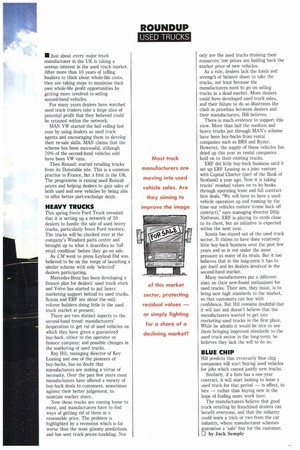• Just about every major truck manufacturer in the UK
Page 39

If you've noticed an error in this article please click here to report it so we can fix it.
is taking a serious interest in the used truck market. After more than 10 years of telling hauliers to think about whole-life costs, they are taking steps to maximise their own whole-life profit opportunities by getting more involved in selling second-hand vehicles.
For many years dealers have watched used truck traders take a large slice of potential profit that they believed could be retained within the network.
MAN VW started the ball rolling last year by using dealers as used truck agents and encouraging them to develop their re-sale skills. MAN claims that the scheme has been successful, although 70% of the second-hand vehicles sold have been VW vans.
Then Renault started retailing trucks from its Dunstable site. This is a common practice in France, but a first in the UK. The programme is raising used Renault prices and helping dealers to gain sales of both used and new vehicles by being able to offer better part-exchange deals.
H EAVY TRUCKS
This spring Iveco Ford Truck revealed that it is setting up a network of 20 dealers to handle the sale of used heavy trucks, particularly Iveco Ford tractors. The trucks will be checked over at the company's Winsford parts centre and brought up to what it describes as 'full retail condition' before they go on sale.
As CM went to press Leyland Daf was believed to be on the verge of launching a similar scheme with only 'selected' dealers participating.
Mercedes-Benz has been developing a finance plan for dealers' used truck stock and Volvo has started to put heavy marketing support behind its used trucks. Scania and ERF are about the only volume builders doing little in the used truck market at present.
There are two distinct aspects to the second-hand trend: manufacturers' desperation to get rid of used vehicles on which they have given a guaranteed buy-back, either to the operator or finance company; and possible changes in the marketing of used trucks.
Ray Hill, managing director of Key Leasing and one of the pioneers of buy-backs, has no doubt that manufacturers are making a virtue of necessity. Over the past few years most manufacturers have offered a variety of buy-back deals to customers, sometimes against their better judgement, to maintain market share.
Now these trucks are coming home to roost, and manufacturers have to find ways of getting rid of them at a reasonable price. The problem is highlighted by a recession which is far worse than the most gloomy predictions and has sent truck prices tumbling. Not
only are the used trucks draining their resources; low prices are holding back the market price of new vehicles.
As a rule, dealers lack the funds and strength of balance sheet to take the trucks, not least because the manufacturers need to go on selling trucks in a dead market. More dealers could have developed used truck sales, and their failure to do so illustrates the clash in priorities between dealers and their manufacturers, Hill believes.
There is much evidence to support this view. More than half the medium and heavy trucks put through MAN's scheme have been buy-backs from rental companies such as BRS and Ryder. However, the supply of these vehicles has dried up this year as rental companies hold on to their existing trucks.
ERF did little buy-back business until it set up ERF Leasing as a joint venture with Capital Charter (part of the Bank of Scotland) a year ago. Now it is taking trucks' residual values on to its books through operating lease and full contract hire deals. We will have to have a used vehicle operation up and running by the time our vehicles mature (come back off contract)," says managing director Dilip Nathwani. ERF is playing its cards close to its chest, but an initiative is expected within the next year.
Scania has stayed out of the used truck sector. It claims to have done relatively little buy-back business over the past few years and so is not under the same pressure as many of its rivals. But it too believes that in the long-term it has to get itself and its dealers involved in the second-hand market.
Many manufacturers put a different slant on their new-found enthusiasm for used trucks. Their aim, they insist, is to bring new high standards to the market, so that customers can buy with confidence. But Hill remains doubtful that it will last and doesn't believe that the manufacturers wanted to get into marketing used trucks in the first place. While he admits it would be nice to see them bringing improved standards to the used truck sector in the long-term, he believes they lack the will to do so.
B LUE CHIP
Hill predicts that eventually blue chip companies will start buying used vehicles for jobs which cannot justify new trucks.
Similarly, if a firm has a one-year contract, it will start looking to lease a used truck for that period — in effect, to hire — rather than buying new in the hope of finding more work later.
The manufacturers believe that good truck retailing by franchised dealers can benefit everyone, and that the industry could learn a trick or two from the car industry, where manufacturer schemes guarantee a 'safe' buy for the customer.
• by Jack Semple












































































































